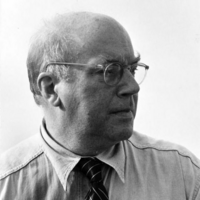The Things
The house in Broad Street, red brick, with nine rooms
the weedgrown graveyard with its rows of tombs
the jail from which imprisoned faces grinned
at stiff palmettos flashing in the wind
the engine-house, with engines, and a tank
in which young alligators swam and stank,
the bell-tower, of red iron, where the bell
gonged of the fires in a tone from hell
magnolia trees with whitehot torch of bud
the yellow river between banks of mud
the tall striped lighthouse like a barber’s pole
snake in the bog and locust in the hole
worn cigarette cards, of white battleships,
or flags, or chorus girls with scarlet lips,
jackstones of copper, peach tree in the yard
splashing ripe peaches on an earth baked hard
children beneath the arc-light in a romp
with Run sheep Run, and rice-birds in the swamp,
the organ-grinder’s monkey, dancing bears,
okras in baskets, Psyche on the stairs—
and then the north star nearer, and the snow
silent between the now and long ago
time like a train that roared from place to place
new crowds, new faces, for a single face
no longer then the chinaberry tree
nor the dark mockingbird to sing his glee
nor prawns nor catfish; icicles instead
and Indian-pipes, and cider in the shed
arbutus under pinewoods in the spring
and death remembered as a tropic thing
with picture postcard angels to upraise it
and trumpet vines and hummingbirds to phrase it
then wisdom come, and Shakspere’s voice far off,
to be or not, upon the teacher’s cough,
the latent heat of melting ice, the brief
hypotenuse from ecstasy to grief
amo amas, and then the cras amet,
the new-found eyes no slumber could forget,
Vivien, the affliction of the senses,
and conjugation of historic tenses
and Shakspere nearer come, and louder heard,
and the disparateness of flesh and word,
time growing swifter, and the pendulums
in shorter savage arcs that beat like drums—
hands held, relinquished, faces come and gone,
kissed and forgotten, and become but one,
old shoes worn out, and new ones bought, the gloves
soiled, and so lost in limbo, like the loves—
then Shakspere in the heart, the instant speech
parting the conscious terrors each from each—
wisdom’s dishevelment, the purpose lamed,
and purposeless the footsteps eastward aimed
the bloodstream always slower, while the clock
followed the tired heart with louder knock,
fatigue upon the eye, the tardy springs
inviting to no longer longed-for things—
the birdsong nearer now than Shakspere’s voice,
whispers of comfort—Death is near, rejoice!—
remember now the red house with nine rooms
the graveyard with its trumpetvines and tombs—
play jackstones now and let your jackstones be
the stars that make Orion’s galaxy
so to deceive yourself until you move
into that house whose tenants do not love.

